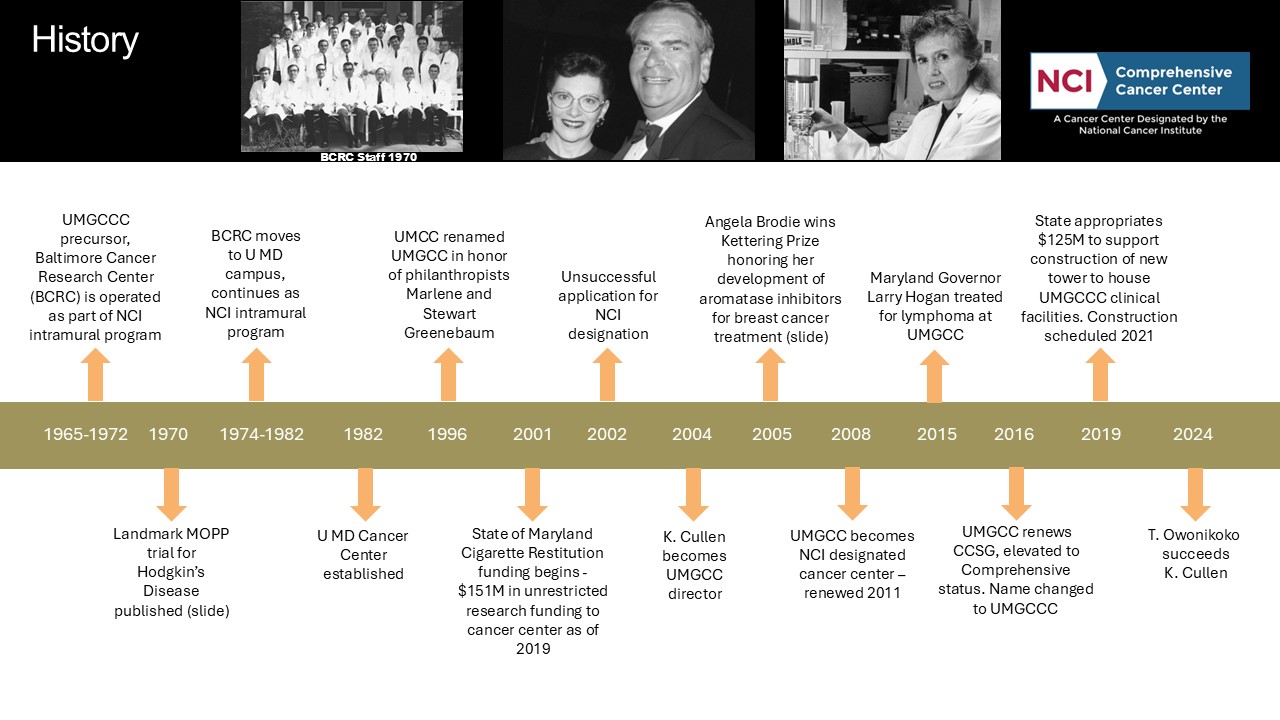
Origins and Early Development
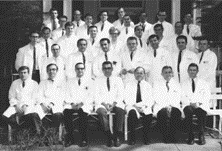
BCRC Staff, 1970
The University of Maryland Marlene and Stewart Greenebaum Comprehensive Cancer Center (UMGCCC) traces its origins to 1965, when NCI created an intramural program within the Division of Cancer Treatment at the U.S. Public Health Service Hospital in Baltimore. The intramural program was formally designated as the Baltimore Cancer Research Center (BCRC) of the National Cancer Institute (NCI). In 1974, following President Nixon’s decision to close U.S. Public Health Service hospitals, BCRC was moved into the University of Maryland School of Medicine (UMSOM), where it rented space and continued to operate as a Federal program. BCRC continued as an intramural program until 1982, when it was finally transferred from NCI by contract to the University of Maryland and renamed the University of Maryland Cancer Center. Since then, the Cancer Center has remained under the administrative authority of UMSOM.
The Greenebaum Legacy and Expansion
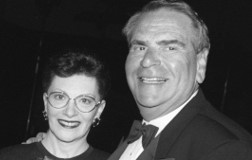
Marlene and Stewart
Greenebaum
In 1996, the Cancer Center was renamed UMGCC in recognition of a $10 million gift by Baltimore philanthropists Marlene and Stewart Greenebaum. Dr. Sanford A. Stass, chair of the Department of Pathology, was appointed director in March 1997, with a reaffirmation of the mandate to translate the institutional commitment into a nationally competitive, NCI-designated cancer center. In September 1999, UMGCC, with Dr. Stass as the principal investigator (PI), successfully competed for a three-year P20 Cancer Center Planning Grant.
State Support and the Role of the Cigarette Restitution Fund
The planning process assessed the need for additional financial support, and UMGCC, in conjunction with institutional leadership, proposed to the State that the Cigarette Restitution Fund (CRF) might be a funding source. This proposal to use funds from CRF was consistent with UMGCC’s role and its continuing receipt of State financial support. UMGCC and the institution proposed that CRF monies be designated for translational cancer research.
In June 1999, the Maryland General Assembly approved legislation providing multiyear support to UMGCC for translational cancer research. UMGCC received a Statewide Academic Health Center Cancer Research Grant of over $7 million in FY2001 and to date has received more than $175 million through this program. In 2006, this appropriation was written into permanent law. University of Maryland receives additional CRF funding to support the Baltimore City Cancer Program (BCCP) which remains a key component of UMGCCC’s efforts in community outreach and engagement (COE). These grants provide a variety of cancer prevention and control activities, including health promotion and disease prevention screenings, the promotion of increased cancer awareness and participation in clinical trials, and expanded telemedicine linkages to minority and underserved populations.
Leadership and NCI Designation
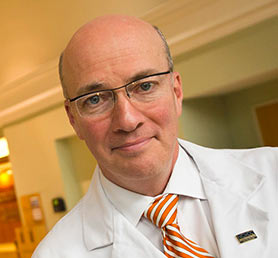
Dr. Kevin Cullen
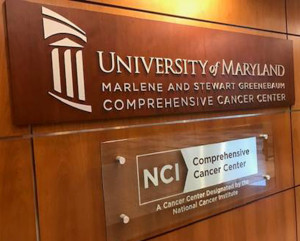
Dr. Kevin Cullen became the new director of UMGCC in January 2004 after serving as acting director of Georgetown University’s Lombardi Comprehensive Cancer Center. With continued support from the State of Maryland through CRF, Dr. Cullen reorganized and expanded the clinical and research arms of UMGCC, culminating in a resubmission of the NCI P30 Cancer Center Support Grant (CCSG) application to NCI in fall 2007. UMGCC received NCI Cancer Center designation in August 2008. In the same year, U.S. News & World Report ranked UMGCC in the top 50 U.S. cancer centers for the first time. It has remained in this top-50 ranking for the past 13 years. UMGCC achieved its “Comprehensive” designation in its CCSG renewal of 2016. The Cancer Center’s name now reflects that designation.
Scientific Contributions and Global Impact
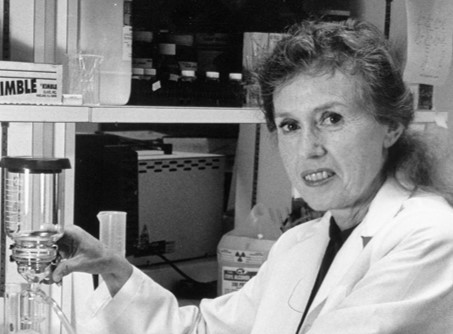
Dr. Angela Brodie
UMGCCC science has influenced cancer care around the world. A seminal example of this is the work of Dr. Angela Brodie, who invented aromatase inhibitors for the treatment of breast cancer at UMGCCC. These drugs have had a dramatic impact on the treatment of this disease and are now the standard of care worldwide. Dr. Brodie received numerous honors for her work, including the General Motors Cancer Research Foundation Kettering Prize, the Dorothy P. Landon-AACR (American Association for Cancer Research) Prize for Translational Cancer Research, and others. Following her death in 2017, the Greenebaum family funded the Angela and Harry Brodie Distinguished Professorship in Translational Cancer Research. Dr. Stuart Martin, UMGCCC Deputy Director, is the first Brodie Professor.
Recent Milestones and Future Growth
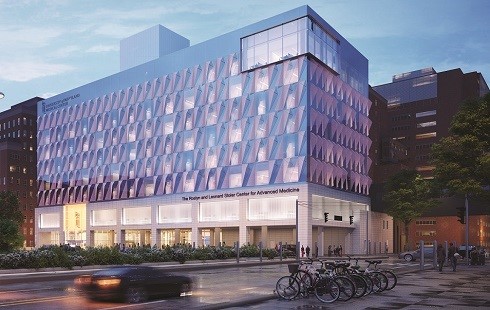
The Roslyn and Leonard Stoler Center for Advanced Medicine—the new home of UMGCCC—slated to open in late 2026
Since the original CCSG designation in 2008, research activities have continued to flourish. Direct cancer research funding now totals $87.2 million (of $114.9 million total funding).
In 2021, UMGCCC broke ground on a nine-story clinical tower, which will house the Cancer Center’s inpatient and outpatient facilities. The project is supported by $125 million in funding from the State of Maryland with additional support through the most successful UMGCCC funding campaign to date. The over 228,000 ft2 facility, which will consolidate all UMGCCC inpatient and outpatient activities in contiguous space, will open in 2025.
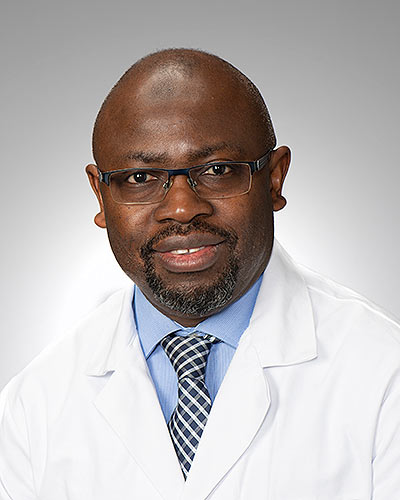
Taofeek K. Owonikoko, MD, PhD
In January 2024, Dr. Taofeek K. Owonikoko, MD, PhD, succeeded Dr. Kevin Cullen who stepped down as director after 20 years. Dr. Owonikoko was named Executive Director of the UMGCCC, Chief of Service at UMMC (University of Maryland Medical Center), Senior Associate Dean for Cancer Programs at UMSOM, and Associate Vice President for Cancer Programs at the UMB. He has a global reputation in thoracic oncology, specializing in treating patients with lung cancer, and is internationally regarded as one of the preeminent physician-scientists in cancer research.
Dr. Owonikoko said he was "greatly honored and humbled to be selected as the next director of UMGCCC. My gratitude goes to the search committee members and the leadership team across UMB and UMMS for this incredible opportunity. I look forward to joining this vibrant and collegial community and working together to actualize the strategic vision to bring UMGCCC to greater heights by building on the solid foundation laid over the past two decades, through the strong work of my predecessor, Dr. Kevin Cullen, and the entire faculty and staff."
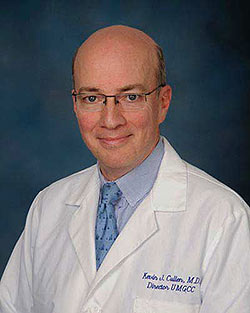
Kevin Cullen, MD
Dr. Cullen commented about his successor: "Taofeek is a superb clinician-scientist with extensive leadership experience. His recent work at two NCI-designated cancer centers will serve him well as he leads UMGCCC through its next phase of growth. I believe the Greenebaum Comprehensive Cancer will thrive under his direction, and I am delighted that he has chosen to come to Baltimore. As I step down after 20 years, I know the cancer center is in excellent hands."
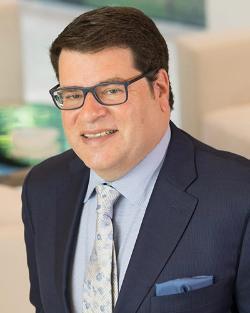
Michael Greenebaum
"We are thrilled to have Dr. Owonikoko as our new leader. He is a world class physician-scientist who is ideally suited to carry on the tremendous legacy of Dr. Cullen," said Michael Greenebaum, President, Greenebaum Enterprises and Vice Chair, UMSOM Board of Visitors, whose parents, Marlene and Stewart Greenebaum, gave the founding gift for the UM Marlene and Stewart Greenebaum Comprehensive Cancer Center (UMGCCC) in 1994. "We are confident that he will take the UM Greenebaum Comprehensive Cancer Center to even greater heights of excellence in both research and patient care. On behalf of our entire family, we want to express our deepest gratitude to Dr. Cullen for his outstanding leadership over the past two decades. We will always have the greatest admiration for him as a close friend and colleague," he added.